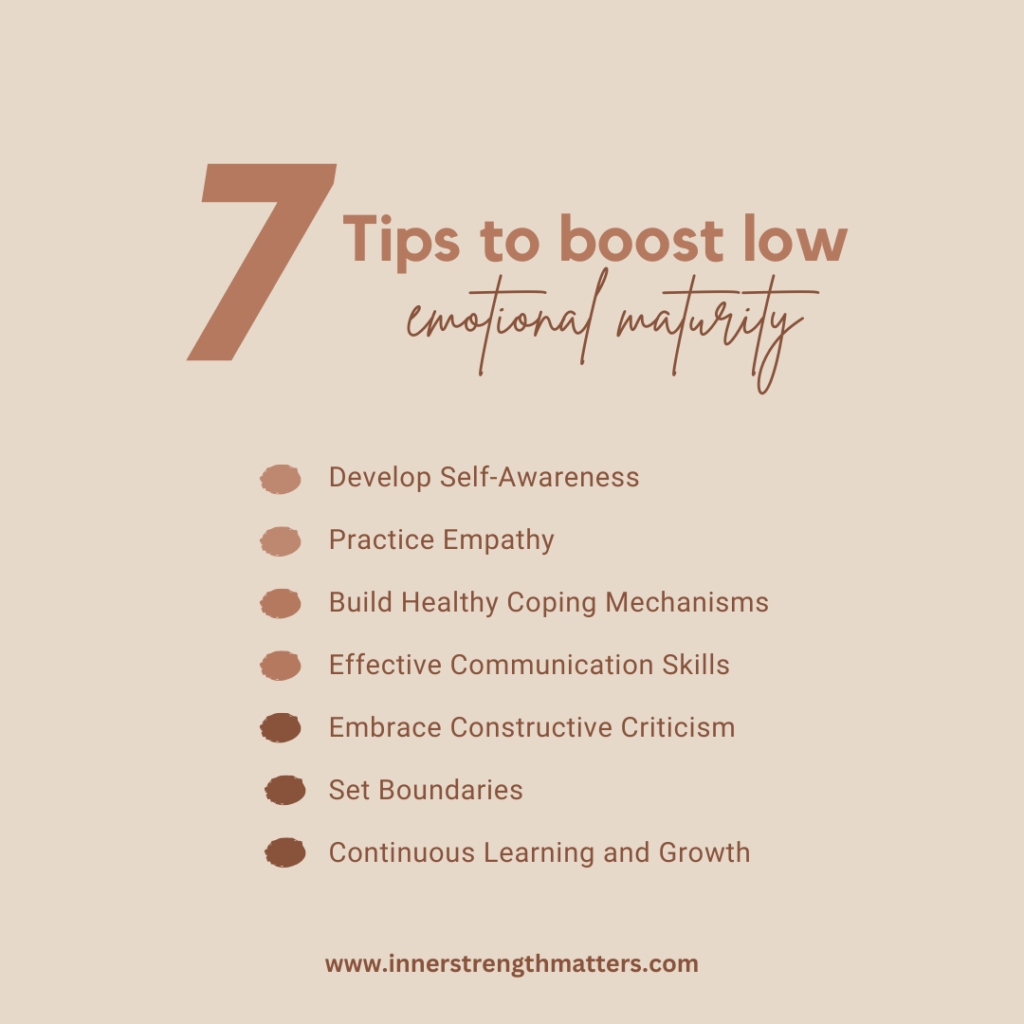Emotional maturity plays a pivotal role in our overall well-being, affecting how we navigate relationships, handle stress, and make decisions. In this article, we’ll delve into the concept of emotional maturity, its importance, and practical tips to enhance and boost low emotional maturity.
What is Emotional Maturity?
Emotional maturity refers to the ability to understand, manage, and express one’s emotions in a constructive and balanced manner. It involves a set of skills and traits that enable individuals to navigate the complexities of emotions effectively. Emotionally mature individuals exhibit self-awareness, recognizing their feelings and understanding the underlying reasons for them. They can also empathize with others, showing sensitivity and understanding towards different perspectives. Emotional maturity involves the capacity to regulate emotions, avoid impulsive reactions, and respond thoughtfully to situations. It plays a crucial role in forming and maintaining healthy relationships, coping with stress, and making informed decisions based on a well-balanced emotional state.
Importance of Emotional Maturity:
Emotional intelligence is important in different aspects of life. The following are some benefits of emotional intelligence:
Enhanced Interpersonal Relationships
Emotional maturity fosters effective communication, empathy, and understanding, leading to healthier and more fulfilling relationships. It enables individuals to navigate conflicts gracefully and build connections based on trust and respect.
Effective Stress Management
People with high emotional maturity are adept at handling stress and adversity. They can maintain composure in challenging situations, making it easier to find constructive solutions rather than succumbing to impulsive reactions.
Improved Decision-Making
Emotional maturity influences decision-making by promoting rational thinking over impulsive actions. It allows individuals to consider the consequences of their choices, leading to better-informed and well-thought-out decisions.
Personal Growth and Resilience
Emotionally mature individuals view setbacks as opportunities for growth rather than insurmountable obstacles. They bounce back from failures, learn from experiences, and adapt to change more effectively.
Tips to Boost Emotional Maturity:
Here are a few tips to boost your emotional intelligence:

Develop Self-Awareness:
Developing self-awareness is the cornerstone of boosting emotional maturity. It involves consciously recognizing and understanding our own emotions, reactions, and thought patterns. By regularly reflecting on our feelings and acknowledging their sources, we gain insight into our triggers and vulnerabilities. This awareness allows us to respond to situations more thoughtfully, reducing impulsive reactions.
Self-awareness also empowers us to take responsibility for our emotions and behaviors, fostering a sense of accountability. As we become attuned to our strengths and weaknesses, we can proactively work on areas that need improvement, contributing to personal growth. Moreover, self-awareness enables us to communicate more effectively, expressing our needs and boundaries with clarity.
In essence, by developing self-awareness, we create a solid foundation for emotional intelligence. This heightened understanding of ourselves forms the basis for improved interpersonal relationships, effective stress management, and overall elevated emotional maturity.
Practice Empathy:
Cultivate empathy by putting yourself in others’ shoes. Actively listen to their perspectives, validate their feelings, and strive to understand their experiences. Empathy enhances emotional intelligence and strengthens interpersonal connections.
Build Healthy Coping Mechanisms:
Identify and adopt healthy coping mechanisms to deal with stress and challenges. This might include exercise, meditation, deep breathing exercises, or engaging in hobbies that bring you joy. Avoiding destructive behaviors and finding positive outlets for stress is crucial.
Effective Communication Skills:
Improve your communication skills to express your thoughts and emotions clearly and assertively. Learn to listen actively, seek feedback, and communicate your needs and boundaries respectfully. Effective communication fosters healthy relationships and reduces misunderstandings.
Embrace Constructive Criticism:
View constructive criticism as an opportunity for growth rather than a personal attack. Emotionally mature individuals are open to feedback, learn from it, and use it to enhance their personal and professional development.
Set Boundaries:
Establishing and maintaining healthy boundaries is crucial for emotional maturity. Learn to say no when necessary, prioritize self-care, and create a balance between meeting your needs and supporting others.
Continuous Learning and Growth:
Continuous learning and growth contribute significantly to emotional maturity by fostering adaptability and resilience. Embracing new experiences and acquiring knowledge expands our perspective, enabling us to navigate challenges with a more nuanced understanding. Learning from successes and failures cultivates a growth mindset, where setbacks become opportunities for improvement rather than obstacles.
This proactive approach to personal development enhances emotional intelligence, empowering individuals to handle complex emotions and situations with greater ease. In essence, a commitment to continuous learning creates a foundation for emotional maturity by encouraging a mindset of curiosity, adaptability, and ongoing self-improvement.
Conclusion:
Boosting emotional intelligence is a lifelong journey that involves self-reflection, personal development, and a commitment to building positive relationships. By understanding the importance of emotional maturity and implementing practical tips, individuals can enhance their emotional intelligence, leading to a more fulfilling and resilient life.

